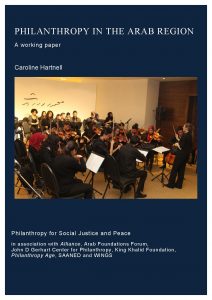 The latest paper features conversations with personnel involved in promoting, supporting and strengthening different areas of philanthropy. The report analyses philanthropic trends in 22 countries across the Middle East and North Africa and covers various methods of philanthropic giving, such as giving by the wealthy through private and corporate foundations, as well as impact investing. It also looks and community and social justice philanthropy, and giving by poorer individuals.
The latest paper features conversations with personnel involved in promoting, supporting and strengthening different areas of philanthropy. The report analyses philanthropic trends in 22 countries across the Middle East and North Africa and covers various methods of philanthropic giving, such as giving by the wealthy through private and corporate foundations, as well as impact investing. It also looks and community and social justice philanthropy, and giving by poorer individuals.
The structure of Arab’s philanthropy remains unique due to its religious roots and cultural influence.
‘Philanthropy in the Arab region is embedded in its culture,’ Atallah Kuttab, the founder and chairman of advisory firm, Saaned, noted in the report. ‘It has a long history, tied to religious giving.’
The report emphasises the expansion of Arab philanthropy in addressing underlying causes of social problems.
‘Before 2011, philanthropy in the Arab world was primarily understood in terms of community charity and occasional giving on religious occasions…not in terms of philanthropy where people respond to the root causes of the problems around them,’ Marwa El-Daly, the founder of Egypt’s Waqfeyat al Maadi Community Foundation, is quoted as saying in the report. ‘After the Arab Spring, concepts like social justice, equity and democracy appeared on the scene.’
Commentators in the report also note social enterprise as a growing force in Arab’s philanthropy. Not only has it created employment opportunities for the younger generation, but also registering as a social enterprise proves to be easier due to the restrictions placed on NGOs, the report says.
However, the Arab region’s philanthropy still needs to do more for human rights. Samar Haidar, a former vice-president of the Arab Foundations Forum stresses ‘local philanthropy institutions, individual philanthropists and the business sector need to take more risks in supporting social justice and human rights work in the Arab region.
This article by was originally published by Alliance magazine on 21 March 2018. The original article can be found here. For more philanthropy and social investment coverage, please visit www.alliancemagazine.org.